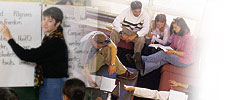 |
|
|
|
| Print | Back Getting the Big Picture Over millions of years, we have evolved. Through seeing, hearing, experiencing, and thinking, we have learned the workings of the world, and so, adapted. The written word, however, is a very recent development, when speaking in terms of the universe's lifespan. Memorizing written words is an even newer concept. It has been estimated that whatever amount of time children spend at school, they spend twice as much time watching television and movies. Some might label this as laziness, and advocate forcing our children to behave differently. Others observe that children display a greater response to sights and sounds than they do to written words alone. A few of us have inherited a gift for learning by reading words. These people have a distinct advantage over others in our educational system; others may be just as intelligent, but simply learn in different ways. Some educators say that although almost all of us will learn to read, 50% of us will remain functionally illiterate. This entails that 50% of the population does not learn by reading. Our job, as educators, should not be attempting to change a person's genetic predisposition. This would be like trying to change someone from being right-handed to left handed. We must seek a teaching method that will work well for essentially everyone. Rather than stressing a method of learning that focuses solely on the written word, we must emphasize diversity in our mental abilities. By their behavior, students of all ages are informing us that they respond very well to audiovisual presentations. This is one of the most effective means of conveying information. We all need an extensive fund of knowledge in order to thrive in the world. Rote memorization, however, is burdensome, stressful, and slow. Such a process does not contribute to our ability to survive in the world. Most of the information learned is committed to short term memory, and quickly forgotten. Audiovisual presentations are enjoyable, require little effort on the part of the teacher, and enable students to incorporate a prodigious amount of information into their long-term memory. |
|
|